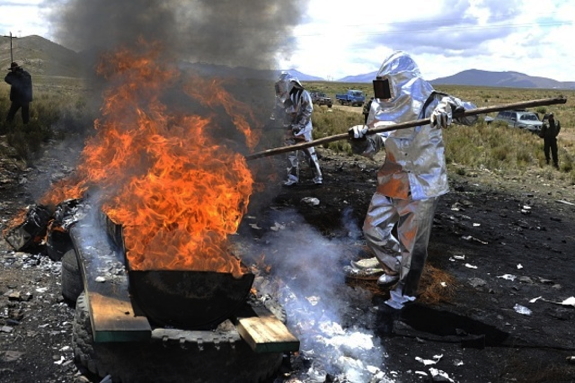
(above) here's a lot more left. Photographer: Jorge Bernal/AFP/Getty Images
Bolivia's Hollow Victory in the War on Drugs
August 24, 2015 - Bloomberg View
By Mac Margolis
Last week the United Nations Office on Drugs and Crime turned some heads. In a much-publicized press conference in La Paz, the UN announced Bolivia had reduced the amount of land planted with coca -- the waxy leafed bush from which cocaine is made -- for the fourth year running.
For anyone following the lose-lose global drug war, this was encouraging news. True, coca cultivation has been declining across the Andes since 2008, but the steep retreat in Bolivia -- down by a third in four years -- has drawn attention and plaudits. Not least because it was achieved far from the gimlet eye of the U.S. Drug Enforcement Agency.
Cue the applause for Bolivian president Evo Morales, who kicked out the DEA in 2008 after accusing the agency of meddling in issues of national sovereignty. Instead, Morales, a former coca grower, leveraged his clout with the unions to negotiate a decrease in the annual coca crop, 60 percent of which is sold legally.
Yes, Bolivia is the only nation exempted from an international ban on planting coca, which highland farmers brew into tea and have chewed for millennia to ward off hunger. There is even a Vice Ministry for Coca and Rural Development, which now and again organizes projects to convert the alkaloid-laced leaf into toothpaste, medication and industrial beverages.
"This was an achievement of rationalization, dialogue and cooperation with coca growing unions in permitted areas, as well as forced eradication in non-permitted areas," said the UN's Antonino De Leo, from La Paz. So much for Tio Sam's war on drugs.
Skeptics are less enthusiastic. Soon after the UN announced its survey, critics noted that the report focused on the coca leaf but omitted data on how much of the crop is being converted to cocaine. And without that data, the heralded fall in coca may be an optical illusion.
"While voluntary reduction of coca shows that small farmers can play a role in national drug policies, the government doesn't keep consistent data on the drug trade and cocaine production," Bolivian economist Roberto Laserna, of Fundacion Milenio, told me. "They are controlling coca leaf, but indications are that trafficking and transport of the drug are increasing."
One yardstick for the problem is the almost sevenfold rise in arrests for drug possession, up from 238 in 2000 to 1,456 in 2012, the last complete year for which Bolivia's National Statistics Office has published statistics.
Another is the spiking volume of drugs seized by police: from 1,300 kilos of cocaine in 2005 to 4,175 kilos in 2012, according to the same census.
And since not even the most stalwart of nationalists can vouch for a corresponding surge in the efficiency of the overstretched Bolivian police, it's reasonable to conclude that the nation's drug problem is getting worse.
Former national drug control minister Ernesto Justiniano told a nationwide television show last week that Bolivia's cocaine production amounts to a staggering 160 tons a year, double the figure for 2008.
The White House Office on National Drug Control Policy recently reported that after declining from 2010 to 2012, Bolivian coca cultivation and "potential production," which gauges the productivity of coca groves, both spiked again in 2014.
Bolivia's greatest challenge may be the shifting nature of the drug trade. As international cartels have globalized, they have spread their cocaine franchises from Mexico into the Bolivian Andes, where law enforcement is scant and criminals busy. "Trafficking is more sophisticated today, and more difficult to control," Jaime Aparicio Otero, a former Bolivian ambassador, told me. "And that's more dangerous for Bolivia."
One eloquent example is the case of Bolivian trucking magnate Jose Luis Sejas Rosales, who ferried natural gas and oil -- and apparently something more -- from Bolivia to Argentina. Sejas is wanted in Argentina, where security agents intercepted 11 of his trucks carrying 450 kilos of cocaine and precursor chemicals for cocaine laboratories.
The UN's De Leo told me that calculating the amount of cocaine Bolivia turned out last year was not the purpose of the UN annual survey, noting that the government had not authorized such research.
For a proud leader like Bolivia's Morales, eager to win the Latin American drug war his own way, that omission seems incongruous.
This column does not necessarily reflect the opinion of the editorial board or Bloomberg LP and its owners.
To contact the author on this story:
Mac Margolis at mmargolis14@bloomberg.net
To contact the editor on this story:
Philip Gray at philipgray@bloomberg.net